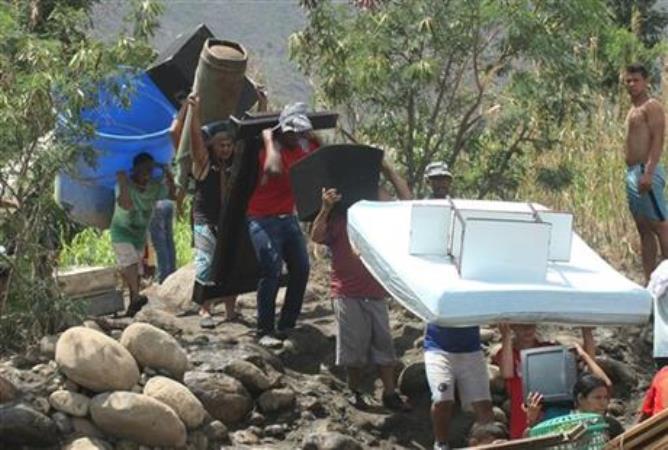
The foreign ministers of Colombia and Venezuela were meeting Wednesday in a bid to reopen a major border crossing after a weeklong crackdown on migrants and smugglers that has heightened tensions between the South American neighbours.
Even as the diplomats met in this Caribbean coastal resort, motorists in the Colombian city of Cucuta complained of long gas lines as Venezuela's security offensive cuts off trade, legal and otherwise, between the two nations.
Across the border, scores of Colombians packed their belongings into suitcases and prepared for an army escort out of Venezuela, joining the estimated 1,000 of their compatriots who have already been deported.
Donamaris Ramirez, the mayor of Cucuta, says he plans to order gas stations to remain open 24 hours to attend to demand met normally by curbside smugglers who purchase gasoline in Venezuela at less than a penny a gallon and resell it for huge profits in Colombia.
With two main border crossings closed, the underground economy has come to a halt, satisfying Venezuelan officials who have long blamed transnational mafias for widespread shortages but also jeopardizing the livelihood of tens of thousands of poor Colombians who depend on the black market.
Colombian President Juan Manuel Santos is traveling Wednesday to Cucuta to show solidarity with deportees who have overrun emergency shelters. On Tuesday, a group of 100 Colombians fled the border town of San Antonio del Tachira by wading across a knee-deep river with their possession, everything from TVs to doors, slung across their backs.
"Raiding homes, removing people by force, separating families, not letting them remove the few goods they own and marking their homes for demolition are totally unacceptable practices," Santos said Tuesday in his sharpest rebuke yet of Venezuela's actions. "They recall the bitterest episodes in history that can't be repeated."
While some 5 million Colombians live in Venezuela, the security offensive has focused on a few towns near the border where Venezuelan President Nicolas Maduro blames migrant gangs for rampant crime and smuggling that has caused widespread shortages.
The crisis was triggered a week ago when gunmen Maduro claimed were paramilitaries linked to former Colombian President Alvaro Uribe shot and wounded three army officers on an anti-smuggling patrol.
The socialist leader has vowed to keep two normally busy international bridges closed, and possibly extend restrictions to other transit crossings until Colombian authorities help bring order to the porous, 1,400-mile (2,200 kilometer) border. A state of emergency allowing the government to restrict peoples' movement for up to 60 days has been declared in six states.
Venezuelan soldiers blocked the river crossing on Wednesday morning, but were helping Colombian residents of a slum that is slated for demolition leave Venezuela via a legal bridge crossing.
A group of about 300 Colombians staged a protest Wednesday in front of Venezuela's embassy in Bogota. Led by Uribe, the group urged Santos to demonstrate greater resolve against tactics the former president compared to those used by the Nazis.
Maduro has angrily denied the denunciations of mistreatment, saying that Venezuelans are unfairly paying the price for Colombia's disregard of its poor.
"Santos has the gall today to seek respect for Colombians. Who is treating Colombians with disrespect? Those that expel them from their country, deny them work and housing and don't provide education?" Maduro said on state TV late Tuesday.
The Colombians who abandoned their cinder block homes Tuesday in a riverside shantytown community known as La Invasion — "the Invasion" — said they were given 72 hours to pack up and leave by Venezuela's army. Officials say the slum has become a haven for paramilitaries and contraband traffickers, and all Venezuelans who live there will be moved to government housing.
In recent decades, many Colombians have moved to Venezuela, either fleeing from conflict or seeking better opportunities in an oil rich country that was long the wealthier of the two.
Critics have accused Maduro of trying to distract Venezuelans from soaring inflation and empty supermarket shelves.
Under the state of emergency, constitutional guarantees such as the right to protest, carry weapons or move freely will be restricted for 60 days, although officials say they are using the powers sparingly.
"I'm sorry if this is creating a humanitarian crisis in Cucuta, but we are only responsible for protecting people who are Venezuelan," National Assembly President Diosdado Cabello said. "Colombia needs to take care of its own problems."
